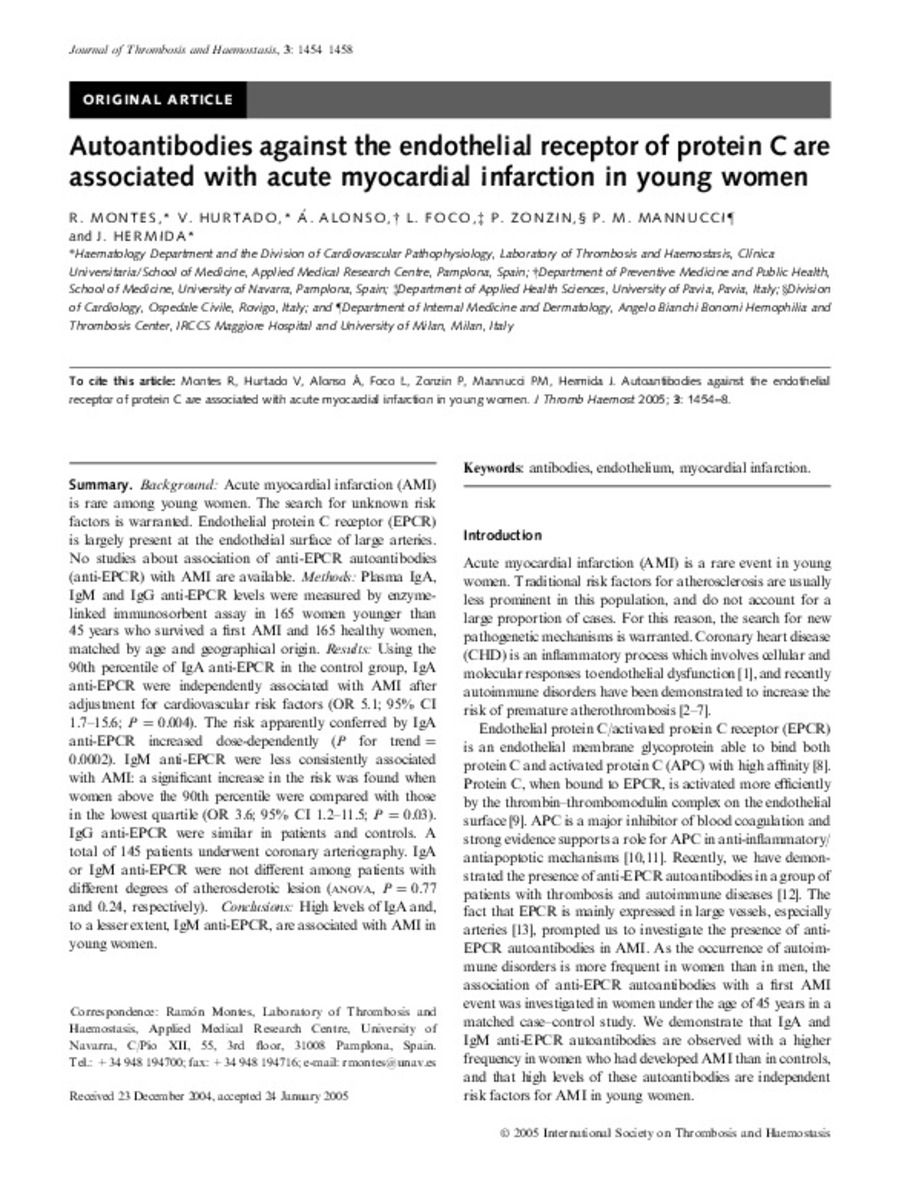Full metadata record
| DC Field | Value | Language |
|---|---|---|
| dc.creator | Montes, R. (Ramón) | - |
| dc.creator | Hurtado, V. (Verónica) | - |
| dc.creator | Alonso, A. (Andrés) | - |
| dc.creator | Foco, L. (L.) | - |
| dc.creator | Zonzin, P. (P.) | - |
| dc.creator | Mannucci, P.M. (P.M.) | - |
| dc.creator | Hermida, J. (José) | - |
| dc.date.accessioned | 2012-05-11T10:53:54Z | - |
| dc.date.available | 2012-05-11T10:53:54Z | - |
| dc.date.issued | 2005 | - |
| dc.identifier.citation | Montes R, Hurtado V, Alonso A, Foco L, Zonzin P, Mannucci PM, et al. Autoantibodies against the endothelial receptor of protein C are associated with acute myocardial infarction in young women. J Thromb Haemost 2005 Jul;3(7):1454-1458. | es_ES |
| dc.identifier.issn | 1538-7836 | - |
| dc.identifier.uri | https://hdl.handle.net/10171/21991 | - |
| dc.description.abstract | BACKGROUND: Acute myocardial infarction (AMI) is rare among young women. The search for unknown risk factors is warranted. Endothelial protein C receptor (EPCR) is largely present at the endothelial surface of large arteries. No studies about association of anti-EPCR autoantibodies (anti-EPCR) with AMI are available. METHODS: Plasma IgA, IgM and IgG anti-EPCR levels were measured by enzyme-linked immunosorbent assay in 165 women younger than 45 years who survived a first AMI and 165 healthy women, matched by age and geographical origin. RESULTS: Using the 90th percentile of IgA anti-EPCR in the control group, IgA anti-EPCR were independently associated with AMI after adjustment for cardiovascular risk factors (OR 5.1; 95% CI 1.7-15.6; P = 0.004). The risk apparently conferred by IgA anti-EPCR increased dose-dependently (P for trend =0.0002). IgM anti-EPCR were less consistently associated with AMI: a significant increase in the risk was found when women above the 90th percentile were compared with those in the lowest quartile (OR 3.6; 95% CI 1.2-11.5; P = 0.03). IgG anti-EPCR were similar in patients and controls. A total of 145 patients underwent coronary arteriography. IgA or IgM anti-EPCR were not different among patients with different degrees of atherosclerotic lesion (anova, P = 0.77 and 0.24, respectively). CONCLUSIONS: High levels of IgA and, to a lesser extent, IgM anti-EPCR, are associated with AMI in young women. | es_ES |
| dc.language.iso | eng | es_ES |
| dc.publisher | Wiley-Blackwell | es_ES |
| dc.rights | info:eu-repo/semantics/openAccess | es_ES |
| dc.subject | Antibodies, | es_ES |
| dc.subject | Endothelium | es_ES |
| dc.subject | Myocardial infarction | es_ES |
| dc.title | Autoantibodies against the endothelial receptor of protein C are associated with acute myocardial infarction in young women | es_ES |
| dc.type | info:eu-repo/semantics/article | es_ES |
| dc.relation.publisherversion | http://onlinelibrary.wiley.com/doi/10.1111/j.1538-7836.2005.01297.x/abstract | es_ES |
| dc.type.driver | info:eu-repo/semantics/article | es_ES |
Files in This Item:
Statistics and impact
Items in Dadun are protected by copyright, with all rights reserved, unless otherwise indicated.






